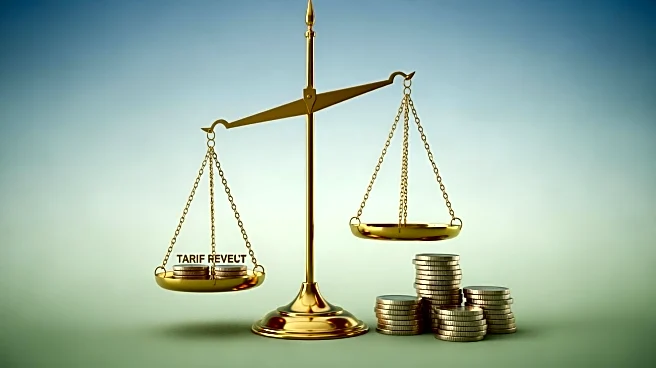What's Happening?
The U.S. Treasury Department has confirmed a $1.8 trillion deficit for the fiscal year 2025, mirroring the previous year's deficit. This announcement comes despite the collection of an additional $118
billion in tariff revenue and approximately $200 billion in reduced deficits due to changes in the expected future cost of the student loan portfolio. The monthly Treasury statement revealed a surplus of $198 billion for September, largely attributed to one-time savings from student loan reforms and a timing shift in payments. Interest on the national debt remains one of the largest federal budget items, surpassing defense spending and trailing only Medicare and Social Security.
Why It's Important?
The persistent deficit highlights ongoing fiscal challenges for the U.S. government, with borrowing continuing at a rate of $5 billion per day. Despite increased tariff revenue and student loan savings, the deficit remains unchanged, underscoring concerns about fiscal responsibility. The deficit's size, nearly $2 trillion outside of emergencies or recessions, raises questions about the government's ability to manage its finances effectively. This situation is exacerbated by a government shutdown, reflecting political dysfunction and the inability to address fiscal issues comprehensively.
What's Next?
The federal government faces the challenge of addressing the deficit amidst political gridlock. The ongoing government shutdown complicates efforts to implement fiscal reforms or reach consensus on budgetary priorities. Stakeholders, including policymakers and fiscal watchdogs, may push for measures to curb spending and enhance revenue collection. The deficit's trajectory suggests potential impacts on future economic policies and government spending priorities, with implications for public services and national debt management.
Beyond the Headlines
The deficit situation raises ethical and governance questions about fiscal responsibility and the prioritization of government spending. The reliance on borrowing and the size of the deficit may influence public trust in government institutions and their ability to manage economic challenges. Long-term implications include potential shifts in fiscal policy and the need for structural reforms to ensure sustainable economic growth and debt management.









